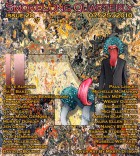Sometimes I think the thing that really makes a story great is the way it ends. I love the ending of your story—it’s a perfect image to end on. How do you know when you’ve hit on the right ending?
Thank you very much.
I long to uncover something about my characters that will enlighten me, and most often I come across a moment in which a character comes into an awareness that surprises us both. It’s a moment that answers a question I have yet to ask, an unerring truth for which I am grateful, grateful to my character for his struggles. It’s when I trust to let go as a writer.
So do you as the writer think that the Barter kid is really going to grow up bad? Or is the narrator just projecting?
In the narrator’s intolerance of the Barter child, I see the man’s own desolation, and yet I believe his depiction of the volatile environment in which the boy is raised, which in itself should be an indicator that the boy may not be given the necessary tools to become a well-adjusted member of society. However, the mother does confront the widow, in regards to her child’s confiscated toys, and it is this protective impulse that suggests the mother-son relationship is more nurturing than one might assume from the narrator’s unfavorable portrayal of both the mother and son. It is in the maternal gesture that I find hope for the Barter kid.
Your bio mentions all the different places you’ve lived. How has moving around much helped in your writing? Do you write about the places you’ve lived, or do you prefer imagining new places?
As a social anthropologist my mother exposed me to social and cultural conditions in Africa, Europe, South America and the Middle East. By paying microscopic attention to a subject, I was drawn into the gradation of the individual’s existence, attached to the particulars of the self and our place in the world. While I was growing up, airports were my equivalent of the mall and hotel lobbies were my favorite places to hangout. I developed a guilty pleasure in people watching—subjects are unlimited—fascinated by our differences as social/cultural beings, while finding comfort in our humanity, which supports me in my writing.
I tend to set my stories in Rio de Janeiro or Cairo, where I came of age. While I find inspiration in the beauty or desolation of a place, it foremost engenders characters with rituals and beliefs.
What other writing projects are you working on right now?
I’m at work on a novel, On the Outskirts of the City of the Dead, set in Cairo during the late 80’s/early 90’s. The story opens in the back of a smoky coffee shop where locals and foreigners mingle; the poor and the wealthy; believers and infidels; trend and tradition. We follow the characters out into the city and the structure is set up to give an overview of the entire society. A modern upper-middleclass girl is in love with a tourism policeman—a new breed of lawmen. A Canadian tourist in a bazaar steals a set of prayer beads. When a boatman considers a second wife, his young wife finds an ally in her mother-in-law. The son of a fisherman finds friendship when he is arrested for begging and expatriate teenagers are arrested for prostitution. A young man forsakes his family upon learning English to get a job at a hotel as a pool boy.
I’m balancing things out by simultaneously working on a short story set in Rio de Janeiro during the military coup of 1964, about a girl whose father (driver) and mother (maid) are hired by a wealthy family with ties to the military regime.
I’m thankful to my sister, Antonia, and husband, Matthew Curry, whose love and support has kept me inspired, grounded, and writing.
Tell us about some of the things you’re reading, watching, listening to these days.
Over the last year I have been voraciously reading literary journals. There are so many great ones out there. They give me hope for the written word, its makers and lovers.
To put it simply, I mostly watch crap TV and crap movies. I don’t mean that the small/big screen is crap, but rather that I watch crappy television and movies. This is when my soul takes a break. The crappier a program is, the more soothed I become. And damn it, sometimes I just want not to care.
I have noticed that for some time now I have not listened to music and have I’ve begun to sleep with earplugs. Perhaps I should talk to someone about this.




 Included in the price of SmokeLong Fitness:
Included in the price of SmokeLong Fitness: